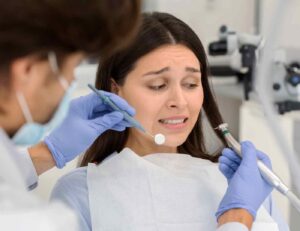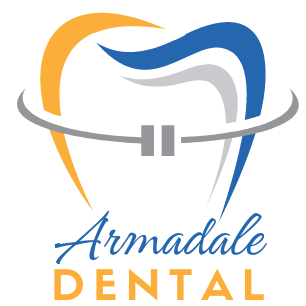Understanding Dentophobia: Fear of the Dentist
Dentophobia, also known as odontophobia, is a crippling fear of the dentist. People suffering from dentophobia often experience overwhelming anxiety at the mere thought of a dental appointment or while sitting in the dentist’s chair. But what exactly is dentophobia, and how does it differ from a general fear of dental treatment?

Exploring Dentophobia and Phobias
Dentophobia falls under the umbrella of specific phobia disorders, which are a type of anxiety disorder. Specific phobias induce excessive fear in response to a situation or event that isn’t inherently dangerous. In the case of dentophobia, this specific situation is a visit to the dentist.
But what sets dentophobia apart from a general fear of dental treatment? Dentophobia is characterized by an extreme and disproportionate fear, often leading individuals to avoid dental care altogether, even when they’re in pain or require urgent treatment. This severe condition can have far-reaching consequences, including deteriorating dental health and potential impacts on personal relationships and job prospects.
Teeth whitening strips are a quick and simple way to brighten your smile at home, helping remove surface stains from everyday foods and drinks. If you want safe guidance before trying them, you can explore Dental Care in Barrie for helpful information. Many people choose whitening strips because they are easy to use, and for trusted support, Ardagh Family Dentistry is one of the best clinics in the area. Whitening strips use a gentle gel to lighten enamel and can be more effective when your teeth are healthy, so visiting a Dentist in Barrie is a good idea if you have sensitivity or other dental concerns. If you need treatment first, a reliable Dental Clinic in Barrie can help with services like Extractions in Barrie or root treatment such as Root Canal in Barrie before starting any whitening routine.
Prevalence of Dentophobia and Dental Fear
Dentophobia and dental fear are relatively common. In the United States, approximately 36% of people have some degree of dental fear, with 12% experiencing an extreme fear. Dentophobia, the most severe form of dental fear, affects an estimated 3% of adults in industrialized countries, causing them to avoid dental visits entirely.
Interestingly, dental fear is more prevalent in females than males, with nearly 5% of women and 3% of men experiencing dentophobia. But what exactly do individuals with dentophobia fear?
The Fears of Dentophobia
Dentophobia can manifest as fear related to various aspects of a dental visit, including:
- Anesthetic: Some individuals fear that the anesthetic won’t work or worry about side effects like temporary numbness.
- Blood: Hemophobia, or the fear of blood, can lead to anxiety or panic when encountering even minor bleeding during dental procedures.
- Choking: Fear of gagging or choking during dental work can create concerns about breathing or swallowing.
- The Dentist: Negative associations with a dentist, possibly stemming from a past bad experience, can intensify dental fears.
- Pain: Dental procedures, while generally not extremely painful, can still cause discomfort. Those sensitive to pain may dread feeling any discomfort during treatment or afterward.
- Needles: A fear of needles may extend to the injections used in dental procedures.
- Noise: The sounds of dental instruments and drills can trigger anxiety.
- Smells: Unpleasant smells in the dental office or specific odors during dental treatment can induce anxiety.
Risk Factors and Causes of Dentophobia
Several factors can increase the risk of developing dentophobia, including:
- Family History: Having a parent or family member with a phobia or anxiety disorder can elevate the likelihood of developing a phobia.
- Embarrassment: Feeling self-conscious about physical proximity during dental procedures, the appearance of one’s teeth, or concerns about breath odor can contribute to dental fear.
- Helplessness: The sensation of lying in a dental chair with your mouth open for an extended period can lead to a feeling of losing control.
- Modeling: Hearing others express their dental fears can ignite similar anxieties in individuals.
- Past Negative Experiences: Traumatic incidents related to dentistry, such as painful procedures performed without consent or complications from treatment, can lead to dentophobia.
- Traumatic History: A history of abuse, including bullying, child abuse, or sexual violence, can also contribute to the development of dentophobia.
Triggers and Symptoms of Dentophobia
Dentophobia triggers can vary from person to person but commonly include situations like being inside a dental office, hearing or seeing dental instruments, lying in a dentist’s chair, seeing a dentist or dental hygienist, or even thinking about a dental visit. Symptoms can range from mild to severe and include chills, dizziness, sweating, heart palpitations, nausea, shortness of breath, trembling, and upset stomach.
Diagnosis and Treatment of Dentophobia
Dentophobia is recognized as a specific phobic disorder by the American Psychiatric Association (APA). If you experience intense anxiety or fear related to dentistry, your healthcare provider may diagnose you with dentophobia. They might refer you to a mental health professional, such as a psychologist, for a formal evaluation of your symptoms and their impact on your daily life.
Treatment options for dentophobia typically include exposure therapy, which involves gradually exposing individuals to situations or images that trigger their fears, allowing them to work through their responses. Additionally, techniques like acupuncture, cognitive-behavioral therapy (CBT), distraction, guided imagery, hypnotherapy, relaxation techniques, and sedation can be employed to help individuals cope with dental fear.
Complications and Impact of Dentophobia
Untreated dentophobia often leads to poor oral health, as individuals may avoid dental visits entirely. This can result in complications like dental decay, gum disease, missing teeth, and even systemic health issues like heart disease and respiratory infections. Dentophobia can also affect overall well-being, leading to aggression, low self-esteem, self-confidence issues, sleep disorders, and social isolation.
Coping Strategies for Dental Visits
To manage dentophobia during dental visits, consider:
- Scheduling a consultation with your dentist to discuss your fears and determine a plan.
- Informing your dentist about your anxiety, so they can offer support or calming medications.
- Bringing a supportive friend along.
- Choosing a dentist who specializes in treating patients with dental fear.
- Developing signals with your dentist to indicate when you need a break during treatment.
- Visiting the dentist during less busy times to minimize exposure to noisy environments.
Dentophobia may be challenging, but with appropriate treatment and coping strategies, individuals can conquer their fears and prioritize their oral health.
